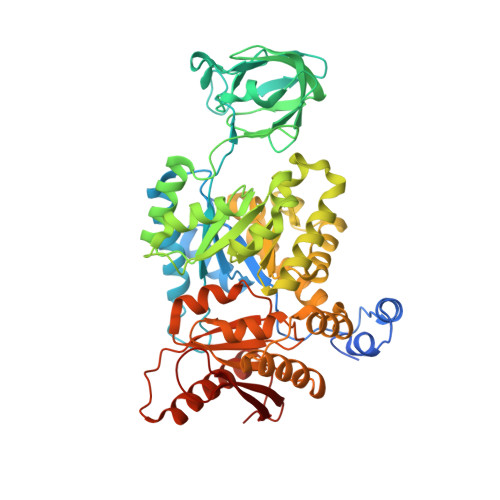Mutations in the PKM2 exon-10 region are associated with reduced allostery and increased nuclear translocation.
Chen, T.J., Wang, H.J., Liu, J.S., Cheng, H.H., Hsu, S.C., Wu, M.C., Lu, C.H., Wu, Y.F., Wu, J.W., Liu, Y.Y., Kung, H.J., Wang, W.C.(2019) Commun Biol 2: 105-105
- PubMed: 30911680
- DOI: https://doi.org/10.1038/s42003-019-0343-4
- Primary Citation of Related Structures:
5X0I - PubMed Abstract:
PKM2 is a key metabolic enzyme central to glucose metabolism and energy expenditure. Multiple stimuli regulate PKM2's activity through allosteric modulation and post-translational modifications. Furthermore, PKM2 can partner with KDM8, an oncogenic demethylase and enter the nucleus to serve as a HIF1α co-activator. Yet, the mechanistic basis of the exon-10 region in allosteric regulation and nuclear translocation remains unclear. Here, we determined the crystal structures and kinetic coupling constants of exon-10 tumor-related mutants (H391Y and R399E), showing altered structural plasticity and reduced allostery. Immunoprecipitation analysis revealed increased interaction with KDM8 for H391Y, R399E, and G415R. We also found a higher degree of HIF1α-mediated transactivation activity, particularly in the presence of KDM8. Furthermore, overexpression of PKM2 mutants significantly elevated cell growth and migration. Together, PKM2 exon-10 mutations lead to structure-allostery alterations and increased nuclear functions mediated by KDM8 in breast cancer cells. Targeting the PKM2-KDM8 complex may provide a potential therapeutic intervention.
Organizational Affiliation:
1Institute of Molecular and Cellular Biology and Department of Life Science, National Tsing-Hua University, Hsinchu, 30013 Taiwan.



















